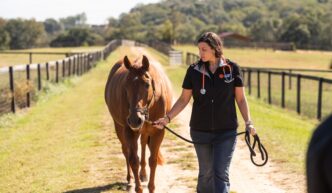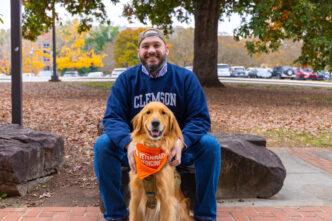Clemson’s College of Veterinary Medicine continues to take shape. The support and enthusiasm we’ve received from stakeholders across the state has been amazing. We’ve also received many questions. Below are some of your frequently asked questions along with our answers.
Why does South Carolina need a College of Veterinary Medicine (CVM)?
There is a critical shortage of both large and small animal veterinarians in the state and beyond. Currently, all South Carolina students go out-of-state for veterinary college. While some return to SC to practice medicine, some do not. South Carolina’s first College of Veterinary Medicine will train highly qualified professionals to help the people and animals in South Carolina.
How long is the program?
The CVM program will be a four-year, cohort-based professional graduate degree. The first 3 years will be spent in an on-campus environment; the remaining 4th year will be spent off-site in a real-world, clinical environment.
What are CVMs admission requirements?
The Doctor of Veterinary Medicine (DVM) Degree is a professional graduate degree. Pending accreditation, we will be looking for good, well- rounded students with a Bachelor’s degree or certain prerequisite classes. CVM is currently in the accreditation process through the American Veterinary Medical Association, so we are unable to release many details. However, for students currently enrolled in undergraduate courses intending to apply to our DVM program in 2025 or beyond, please note that the proposed requirements for admission will not differ greatly from the requirements of other regional DVM programs.
How big will each cohort be?
Pending accreditation, CVM’s first cohort who will arrive on campus in Fall of 2026 will be no more than 80 students.
CVM is a four-year program. Generally, how will classes and the experience be structured?
The first three years will be a mixture of traditional classroom learning as well as in-depth experience with various diagnostic and surgical experiences. Utilizing Clemson’s existing resources, students will also gain experience treating cattle, horses, poultry, sheep, and swine.
CVM will utilize a hybrid distributive style of teaching. What does that mean?
Students will build core veterinary skills the first three years. Their fourth year will be spent in clerkship positions with partnering veterinarians around the state. Students will gain real world experience in general practice, specialty, small and large animal, and zoo and exotic medicine. Students will gain experience working with patients in the CVM clinical teaching building. Students will also experience on-site large animal/farm medicine with the ambulatory unit.
What facilities and resources does the college offer for veterinary students?
Students will utilize existing Clemson farms and related resources. Students will also enjoy a brand new, state-of-the-art campus which will consist of several buildings that will include clinical, farm animal, research and equine teaching. Students will also experience traveling to patients, typically farm animals, in the ambulatory unit.
How will CVM support the whole student during their experience?
The CVM curriculum will be rigorous and challenging. Students will have ample academic and emotional support resources to guide them through the process. The campus itself is serene and designed to blend with the surrounding Experimental Forest. Students will have time during their day to take breaks and enjoy the woodland environment. There will be opportunities for students to collaborate on projects with students and faculty.
Please note: Clemson CVM is not able to accept any student applications for the program pending AVMA Council on Education accreditation.







